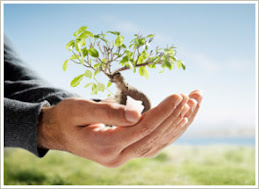Subscribe
Thursday, March 12, 2009
"E" Terms
Biodegradable: Any substance or products that is non-toxic and will decompose into a relatively short time span.Carbon Footprint: The measure of the impact human activities on the environment.Carbon Offset: When you fly or participate in some activity that puts more carbon into the atmosphere, you offset the damages by purchasing certificates or credits that help companies plant trees or invest in alternative energy.Cradle-to-Cradle: A term created by the American architect William McDonough and German chemist Michael Braungart. It refers to products that are designed to either be fully biodegradable or that can be recycled into something else.Electrosmog: Refers to the electromagnetic fields emitted by computers and mobile phones. There is an ongoing debate over whether exposure to electrosmog can cause health problems.EMF: Electromagnetic fields. EMF are energy waves with frequencies below 300 hertz coming from power lines, mobile phones, radar and microwave towers, television and other electrical devices.E-Waste: Discarded electronics (TVs, cell phones, VCRs, computers, etc.) that end up polluting water supplies and landfills with the toxic chemicals used to create them.Eco-Village: A small ecologically sustainable community often powered by renewable energy such as solar or wind-power. Food Miles: The distance your food has to travel to reach your plate.Green Tax: Putting a price on those activities that pollute the environment, such as producing carbon dioxide or using polluting chemicals in agriculture and manufacturing.Greenhouse Effect: Greenhouse gases trap some of the infrared radiation that would normally escape from the earth’s atmosphere, causing the earth to get warmer.Greenhouse Gases: Gases in the earth's lower atmosphere that cause the greenhouse effect. Examples include: carbon dioxide, chlorofluorocarbons, ozone, methane, water vapour and nitrous oxide.Monoculture: The cultivation of a single crop on a large area of land. They can only be produced using vast quantities of pollutants and don’t offer any support to nearby ecosystems.Non-Renewable Resource: Anything that is extracted from the earth that has a finite supply. Examples include: natural gas, copper, aluminium, coal and oil.Renewable Resource: Any resource that renews itself faster than it can be consumed. Since there will be a shortage of sun, wind and water, any energy created from them is renewable.Sustainable Living: Living within your means so that you’re not using up non-renewable resources or polluting the environment.Urban Heat Island: The build up of heat within a city’s inner core, caused by a large concentration of heated buildings, asphalt roofs, factories, cars and heat-producing activities.Upcycling: Creating something useful or valuable from garbage. Examples include: transforming discarded plastic bags into yarn for knitting and recycling pop bottles into carpets. Learn more green lingo with our Green Home Building & Design Terms.
Subscribe to:
Post Comments (Atom)




No comments:
Post a Comment